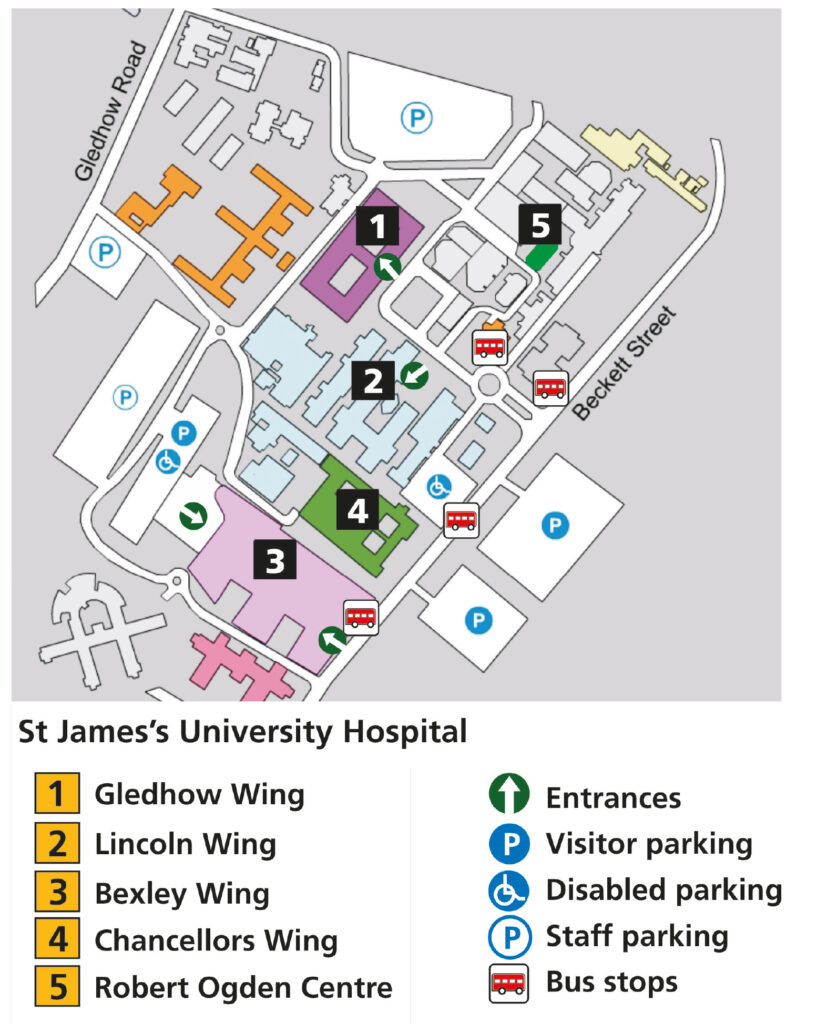This leaflet aims to help you and your family understand more about your radiotherapy treatment.
It will be given to you in addition to the information you will receive from your Clinical Oncologist (who is a specialist doctor in cancer treatment). His/her team will be caring for you during your treatment. This team will include radiographers and clinical nurse specialists but may also include social workers, physiotherapists, occupational therapists, speech and language therapists and dietitians.
The leaflet describes radiotherapy planning and treatment. It also explains the side-effects which you may experience during and after treatment.
Each person’s treatment will vary, so the information given is a general guide. The healthcare team looking after you will explain your treatment and the side-effects in detail. If you have any questions after reading this leaflet, please speak to the team looking after you or ring the numbers at the end of the leaflet.
Staff will make every effort to meet your individual needs or will direct you to the person who can help.
All your radiotherapy planning and treatment will take place in the Radiotherapy Department on Level -2, Bexley Wing, Leeds Cancer Centre (LS9 7TF).
Radiotherapy reception Tel: 0113 206 8940
Please do not bring any valuables into hospital with you as the Trust cannot accept liability for loss or theft.
What is radiotherapy?
Radiotherapy is the use of high energy X-rays and other types of radiation to treat cancer. The radiotherapy causes damage to cancer cells in the treated area. Although normal cells are also affected, they can repair themselves and are able to recover. Radiotherapy is a local treatment. This means it only affects the part of the body being treated.
Radiotherapy is often used as the main treatment for early stage cancer of the larynx. When you are having your radiotherapy you do not feel anything and it does not make you radioactive. You may hear a buzzing noise when the machine is switched on. It is perfectly safe for you to be with other people, including children and anyone who may be pregnant throughout your treatment.
You will have your radiotherapy on a treatment machine called a linear accelerator, as shown here in the photograph. You will see your radiographers at each treatment session and they will be happy to answer any questions you may have.
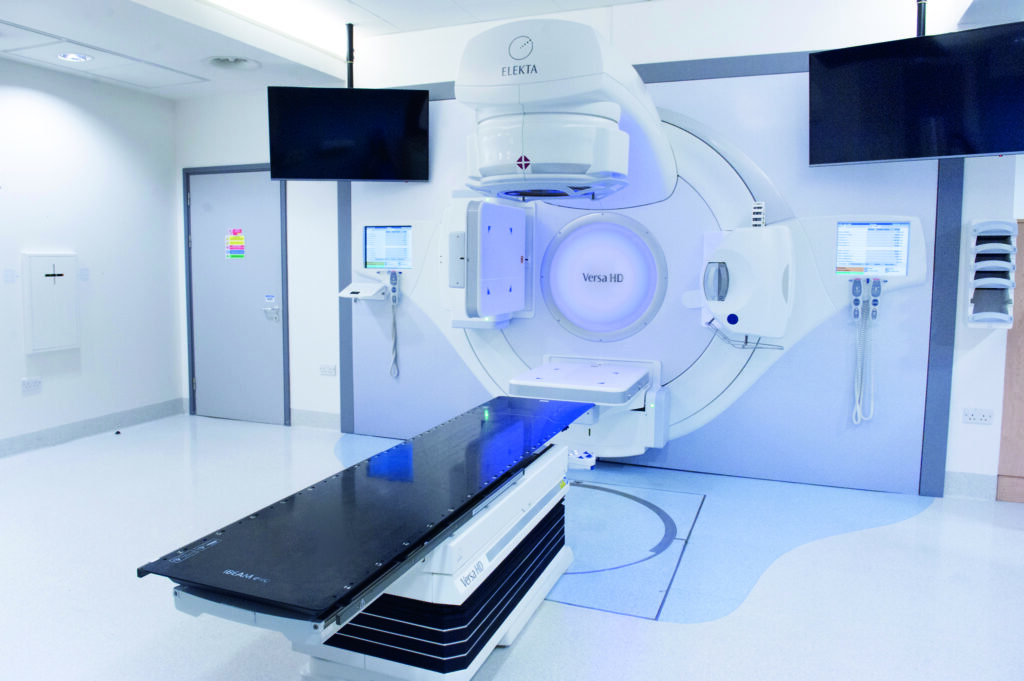
How often is it given?
Radiotherapy to the glottis is usually given over four weeks; this is a total of 20 treatment days. Treatment is generally given daily, Monday to Friday however your treatment may not start on a Monday.
You may need to be treated on a weekend due to a bank holiday and we will let you know if this is the case. Your radiographer will be able to explain the details of your individual radiotherapy appointments.
Your treatment will usually be given as an outpatient.
Visiting us before your treatment
If you would like to visit the radiotherapy department before starting treatment, please call 0113 206 7603. This visit can be very useful as you can find out more information about radiotherapy.

Do I need to stay in hospital for treatment?
Your treatment will be given as an outpatient but if your side- effects become a problem, your doctor may suggest a stay in hospital.
Who will I meet?
Therapeutic radiographers
Radiotherapy is given by therapeutic radiographers of any gender who are highly trained in the accurate planning and delivery of radiotherapy treatment. You will see your radiographers at each treatment session and they will be happy to answer any questions you may have.
Student radiographers
The radiotherapy department is a training centre for therapeutic radiographers. They are supervised at all times. If you do not wish students to be present, please speak to a member of staff. This will not affect your treatment or care.
Others involved in your care
You may meet other staff whilst you are coming for radiotherapy. Everyone you meet will introduce themselves, tell you their job title and explain the role they have in your care.
Important advice before your treatment
Pregnancy
It is very important that patients of child bearing potential are not pregnant at the start of a course of radiotherapy and that they do not become pregnant during a course of radiotherapy because it can have an effect on the unborn child. Use an effective form of contraception, for example condoms, coil, depo injection or contraceptive pill. For more information see the ‘Contraception and pregnancy during cancer treatment’ leaflet.
Please do not hesitate to ask your doctor or nurse if you have any questions or concerns.
Smoking
If you are a smoker we very strongly advise you to stop smoking before treatment. Continuing to smoke during radiotherapy will:
- dramatically reduce the chances of your treatment being successful;
- increase the severity of the side-effects during your treatment;
- increase the risk of serious longer term side-effects;
- increase your risk of developing further cancers in the future.
There are now several ways in which you can receive help to stop smoking.
The NHS Stop Smoking Helpline – Tel: 0300 123 1044
Website: www.nhs.uk/smokefree
You can ask your Clinical Nurse Specialist or GP for local contacts or further support.
Alcohol
Drinking alcohol during your radiotherapy treatment can cause mouth and throat ulcers. It is important not to drink alcohol at all during your treatment. Please see the helpline numbers mentioned towards the back of this leaflet; they may be of use to you.
Planning your treatment
Your first appointment for radiotherapy will be a planning appointment. This will be used to gather all the information we need to accurately plan your treatment. We will contact you by phone with an appointment for your radiotherapy planning session. This will include an appointment for the Mould Room, where they make the radiotherapy masks. Directions to the hospital and transport arrangements will be discussed with you at this point.
Some tests and scans may be needed to help plan your treatment. We will explain which of these you will need when your appointment is made. You may see your clinical oncologist (or a member of their team) at this appointment. This is an ideal opportunity for you to ask questions. If you have not previously consented to your treatment you will be asked to sign a consent form.
What to bring with you:
- a list of all questions you may have;
- an up-to-date list of all the medications you are taking (including inhalers, sprays, vitamins or herbal products);
- any medication that you may need during your visit;
- something to eat and drink and something to occupy yourself with as this first visit can be quite lengthy (up to two hours).
Mould room
Radiotherapy involves exact positioning of the radiation beam, so you will need to stay very still while you are having treatment. To help you stay still we will make a mask for your head and shoulders. You will wear this mask for your planning scan and treatments.
You will be given an appointment to attend Mould Room where the masks are made. If you have any concerns about the mask, please let your clinical oncologist or a member of their team know. We have a support team available to help you.
They can be contacted on 0113 206 7616 or email leedsth-tr.rtpatientsupport@nhs.net
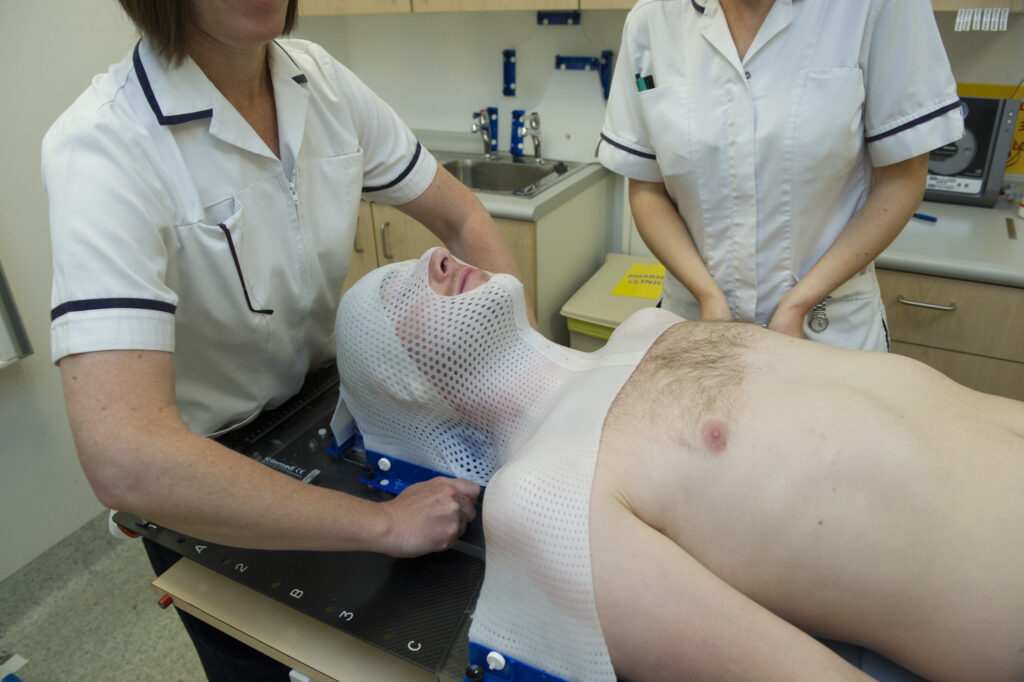
Your planning scan
In order to plan your treatment you will have a planning CT scan. This is done on a machine called a CT Scanner (see photo). It allows the images from the scan to be sent to the radiotherapy computer planning system.
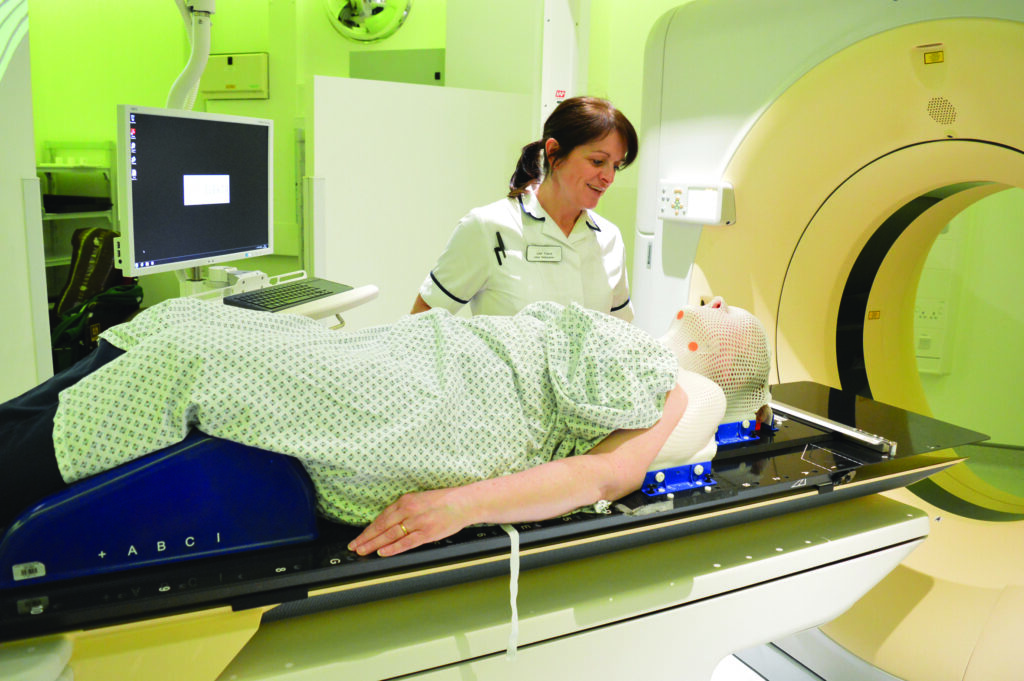
There will be several members of staff present at your scan. These will include therapeutic radiographers, and possibly a mould room technician and a dosimetrist (the person who will produce the computer plan for your treatment).
Planning scans are not diagnostic examinations and will not be reported on as such.
The scan will be taken with you lying in the same position as for your treatment. The radiographers will draw some marks on you, to be used as a reference for your radiotherapy treatment. Most of the other marks will be placed on your mask.
You will then be scanned, which will only take a few minutes. At the end of the scan the pen mark on your skin (usually just one on the front of your chest) will be replaced by a small permanent mark, also called ‘tattoo’.
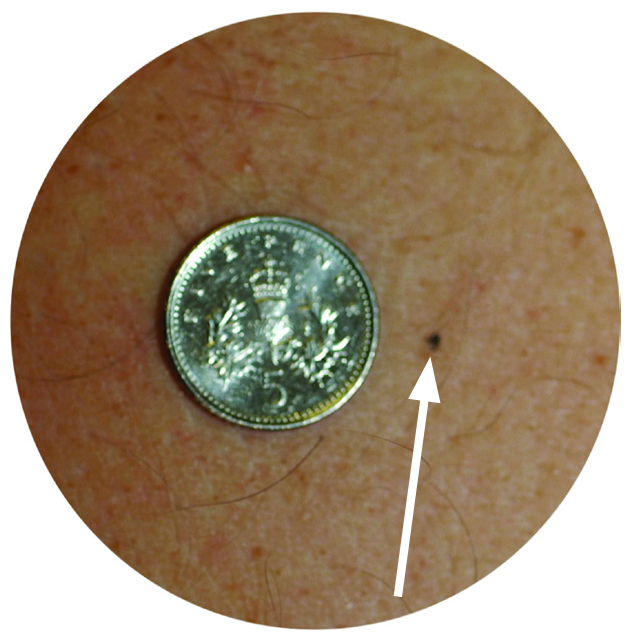
These permanent marks help us to ensure that you are in the same position each day. It also means that you can wash without worrying about your marks coming off.
Following the scan the radiographers will give you the time of your first appointment on the treatment machine; which is most likely to be a couple of weeks after the planning visit. The radiographers will talk to you about any further appointments you have.
Contrast (dye)
It is uncommon for contrast to be used for your CT planning scan for early glottis cancer. However, if on the rare occasion it is used, the following paragraphs briefly explain what happens:
A special contrast agent, often called a dye, may occasionally be used for your scan to make specific organs, blood vessels and/or tissue types ‘stand out’. This can make it easier for the oncologist to plan your treatment.
The dye is given through a small needle into a vein in your arm. You should tell the radiographer if you have any allergies, but they will go over this before they use any dye. The radiographers will advise you about drinking plenty of fluid after your injection.
Contrast side-effects
You may notice a warm feeling throughout your body and have a metallic taste in your mouth. You may also feel as if you have passed urine. This will pass very quickly. There is a slight risk of an allergic reaction to the injection, such as a skin rash, but very rarely may lead to other complications.
The staff in the radiotherapy department are highly trained to manage any complications and again the risk involved is very small.
You will be able to drive your car or go to work after your scan.
Nursing clinic in Princess Royal Suite
Before starting your radiotherapy you will see someone from the nursing team in the radiotherapy review clinic. They will be able to advise you about how to look after yourself during your treatment. You will see them regularly during your treatment.
Having your treatment
When you arrive for your treatment you should go to the radiotherapy reception desk at the entrance of the radiotherapy department. On the first occasion you will be given all your appointments and be escorted to the waiting area for your machine.
The radiographers will explain what will happen and answer any questions that you may have.
Treatment is usually given daily, Monday to Friday however your treatment may start on any day of the week. Whenever possible you will be treated at the time of day that suits you, but this cannot always be arranged or guaranteed. There may be occasions when you may have a longer stay in the department or be asked to attend at a different time, for example to see your oncologist.
You may need to partly undress and put on a gown, the radiographers will discuss this with you when you first attend the department.
The radiographers will position you on the treatment couch, fit your mask and adjust the couch and machine to the correct positions. For the first few treatments and also intermittently during treatment we will also use the scanner attached to the treatment machine to take images to check the accuracy of the treatment which will take a few more minutes.
These images do not monitor your condition but are purely for treatment accuracy.
You will be asked to stay as still as possible during the treatment but you should breathe and swallow normally.
Once you are in the correct position the radiographers will leave the room to switch on the machine. You will only be alone for a few moments at a time. The radiographers will be watching you on a closed circuit TV (CCTV) monitor during treatment. The CCTV camera is not recording or saving any images.
There is an intercom system so the radiographers can talk to you. If you would like to listen to music during your treatment, please let us know.
The treatment only takes a few minutes but you will be in the treatment room for about 10-20 minutes. The machine stops automatically after your prescribed dose of treatment has been given. The radiographers can stop the machine at any time if needed. The treatment machine makes a buzzing sound when switched on. You do not feel anything. The radiographers may need to come in and out part way through each treatment.
After the treatment is complete the radiographers will come back into the room to help you off the couch.
Your treatments will generally be on the same machine, although there may be days when this machine is being serviced and your treatment will be in a different room.
On some days the radiotherapy department may be busy and there may be a delay before your treatment. We will keep you informed of any delays, please see the delay signs in the waiting areas. It may be a good idea to bring something to eat and drink with you, including any supplement drinks you have been asked to have and any medication you may need. There is a restaurant and café available on Level 0.
It is very important that you do not miss treatment days as it may make your treatment less effective. If you feel you are unable to attend for any reason please telephone us so that we can discuss this with you. If you have any queries about your appointment times please discuss these with the radiotherapy co-ordinators on your treatment unit.
For appointment queries please telephone the radiotherapy reception desk 0113 206 8940.
Clinic appointments
You will be seen each week in your consultant’s review clinic and in the nurse-led review clinic. These clinics are held in the Princess Royal Suite on Level -2 of Bexley Wing. You may also have appointments with the dietitians and speech and language therapists. These appointments help us to check how you are managing your treatment. You will be asked about your diet, swallowing, pain control and any other symptoms that you may have. If you have any problems, please let the radiographers who treat you each day know, when you arrive.
Speech and swallowing during radiotherapy
Speech and Language Therapists (SLT) are trained to assess and advise about your ability to swallow and speak. They may assess you before starting radiotherapy or they might become involved in your care if you have problems swallowing or communicating during treatment.
What can I do to help my swallowing?
Some swallowing difficulties may be mild and can be managed easily. Here are a few simple changes you can make to what and how you eat and drink:
- It is really important you continue to do any exercises you have been given by your SLT. This will reduce the risk of long-term tissue fibrosis and will help to keep your swallow functioning;
- Make sure you take any medication given to you by the doctor. If you are still experiencing some pain or discomfort please tell the radiographers or nurses as soon as possible;
- Eat a soft and moist diet rather than dry, hard or crumbly foods. Use lots of sauces and gravy to help the food go down;
- Make sure you drink plenty of water throughout your treatment, to help with dryness in your mouth;
- Take your time when eating. Do not rush;
- Avoid distractions when eating and drinking. Turn off the television and do not talk when chewing and swallowing;
- Do not throw your head back when having a drink. Keep your chin down.
Please let a member of the team know if you experience any of the following when eating and drinking:
- Coughing
- Choking
- Wet “gurgly” voice
- Food or drink sticking in your throat
For more information on how radiotherapy affects your swallowing, please refer to the leaflet ‘Swallowing Difficulties during Radiotherapy’.
Side-effects
Side-effects can be divided into short term (acute) effects that happen during or soon after treatment, and long term effects occurring months or years later. Some side-effects are common, whilst others are rare. Your oncologist will discuss this with you. If you develop any radiotherapy side-effects you will be given advice and support by your healthcare team.
Possible short term side-effects
Most short term side-effects are common and are temporary. Side- effects tend to build up from about the second week of treatment and will be at their worst at the end or just after the treatment course. They generally last a number of weeks or months after the treatment has finished.
Skin reactions
The skin in the treated area starts to redden or darken about 10 days after the start of radiotherapy treatment. It may become dry and itchy. Sometimes later in treatment it may peel and become weepy.
Avoid hair removal where possible, including shaving, waxing, cream and lasers unless advised otherwise by your consultant, nurse or radiographer.
Before you go in for your treatment the radiographer will explain what will happen to your skin and how to look after it. They will also give you a leaflet to take home.
If you are concerned about your skin reaction please talk to your radiographers or contact the review clinic nursing staff in the Princess Royal Suite, telephone: 0113 206 7587.
Tiredness (fatigue)
Nearly all patients having radiotherapy will feel tired. Be prepared to take things easy during treatment and allow for extra rests. Try to continue with some of your normal routines and activities if possible. If you usually work you may find this can help maintain your mood, but you may find it better to reduce your hours or take some time off.
Fatigue usually improves in the weeks to months after treatment.
Things you can do to help include:
- Gentle exercise can help reduce the symptoms of fatigue.
- Having enough to drink can prevent tiredness from dehydration.
- Small meals or snacks eaten more often than three times a day may be easier to face.
- Try to get a good night’s sleep where possible, a daytime nap may help.
- Try to ‘pace’ yourself, listen to what your body is telling you, rest if you need to.
- Pick out the things that you enjoy, and try to accept help with other tasks.
- Little and often is the rule of thumb
There is a Macmillan information leaflet available ‘Coping with fatigue’. If you would like a copy, or support with your fatigue please ask a member of staff.
Sore throat and throat ulcers
This often happens after about two weeks of treatment and can make it more difficult to eat and drink because it might be:
- painful,
- too much effort or
- unsafe if ‘things go down the wrong way’
We will give advice to help you keep up your calorie intake and prescribe painkillers to make you more comfortable. Once the soreness settles after treatment you will be able to reduce your painkillers. If you have any queries about your painkillers after treatment please contact your consultant’s team or your GP.
It is important that you are well nourished and drink plenty of fluids during your treatment. Try to avoid losing weight.
This will keep you healthy and help your body to heal. If you lose a lot of weight during treatment your mask may no longer fit as well. If your mask fit is not good, we will have to ensure your position is correct with daily imaging. If we are concerned that your treatment may be affected we will have to have a new mask made, planning scan and re-plan done. The radiographers will check for this as they position you for treatment each day. We may ask you to see one of our specialist dietitians. Your weight and diet will be checked at the start and regularly through treatment.
When you are part way through treatment, you may need to change to a softer diet. We can give you liquid food supplements if needed. It is very likely that eating will not be enjoyable during treatment, but it is still important to try hard to keep up a good intake of calories.
Chest infection
You must tell the radiotherapy team immediately if you suspect you are developing a chest infection. This may include:
- Spiking a temperature
- Feeling short of breath
- Noticing a change in the colour of your phlegm, commonly yellow/green
- Noticing a new ‘wheeze’ when breathing
- Chest tightness
Sometimes chest infections can be caused by food, drink or medication going ‘the wrong way’ – into your lungs rather than your stomach. This is referred to as ‘aspiration’.
Feeding tube
If your swallowing becomes too uncomfortable, difficult or unsafe, you may not be able to get enough calories from food and supplements. In this case a feeding tube may be recommended by your team. This is usually only a temporary measure and you should be able to swallow safely once the radiotherapy side-effects have fully settled.
Sticky phlegm (‘throat secretions’)
You may produce more or thicker phlegm towards the end of treatment which can be uncomfortable and make you want to cough. We may suggest using a nebuliser to help. Drinking soda water can help loosen the secretions.
However do not drink if you have been advised that there is a risk of things going down the wrong way. Please discuss this with a member of your medical team if you are at all concerned.
Loss of voice
Your voice box can become inflamed and your voice may become hoarse, husky or go completely later in treatment. Your voice strength will generally return within a couple of months after treatment. Your SLT will support you with this.
Constipation
Your bowel habit can be affected by changes in your diet and using painkillers. It is important to keep using your painkillers regularly but please let us know if you are having difficulties opening your bowels (if you’re struggling to have a poo).
Please note
Please read the information leaflets enclosed with any medications used, this will explain any side-effects you may experience when taking them.
If you are at all concerned about any side-effects you are experiencing from your medication, please talk to your pharmacist, nurse specialist or GP.
When radiotherapy has finished
Your side-effects may get worse in the first few weeks after treatment and will then gradually settle. You should start getting back to normal about 4-6 weeks after treatment but it may take a little longer. Tiredness can last for several months and you may need to continue to rest more than usual.
You may be asked to attend the hospital where you were first seen by your oncologist for follow-up checks at regular intervals.
Possible long term side-effects
Long term side-effects can happen months to years after your radiotherapy. The list below can seem alarming, but please remember serious late side-effects are very rare.
- Skin changes: occasionally the skin may be discoloured (usually darker), thickened (fibrosis) and there may be small ‘spider’ blood vessels visible near the skin surface;
- Chest infections as a result of swallowing difficulties;
- Hoarseness: you may experience a change in the quality of your voice;
- Underactive thyroid gland causing a lack of thyroid hormones. This can be easily treated with tablets. This can happen quite a long time after the radiotherapy;
- Damage to the cartilage of the voice box or to the soft tissues of the neck. Occasionally surgery may be needed to correct this. This is a very rare side-effect;
- Damage to the blood vessels; this may lead to a slightly higher risk of stroke;
- Cancers caused years later by having radiotherapy are very rare.
Late skin effects:
- Three months to a year after treatment your skin can appear ‘shiny’ and will also be dry. Look after your skin by using a moisturiser every day. Please note, during treatment only use the skin care products advised by your radiotherapy team.
- Tiny ‘spider’ veins can appear after a year and are permanent. If you are worried by the appearance you can use cosmetic camouflage with a special hardwearing concealer – ask the medical team about this.
Research at Leeds Cancer Centre
Leeds Cancer Centre is a major centre for cancer research.
You may be asked if you would like to help with some of the clinical studies. You are under no obligation to take part in any trials, and your treatment will not be affected in any way if you do not wish to take part.
If you do take part in a clinical trial you may meet a research nurse or radiographer who will be helping to run the trial.
Further information and support
If you have any questions please ask your hospital team.
We all have our own ways of coping with difficulties. Some people have a close network of family and friends who provide emotional support, others would rather seek help from people who are not involved with their illness.
The following are also available as sources of information and support that you may wish to use.
Clinical Nurse Specialists (CNS)
Your CNS is available to discuss any aspect of your treatment with you. You will be seen by a CNS before your treatment. This is to offer support and advice about the practicalities and effects of treatment and answer any questions you may want to ask.
Your CNS will also assess and discuss any physical, psychological, social, occupational or spiritual needs that you may have. They can refer you to other services if needed, for instance, benefits advice.
You should be given a ‘key worker’ as a contact for support through your treatment; this is usually the CNS.
Macmillan Specialist Radiographer and Macmillan Radiotherapy Nurse Specialist
Sometimes people need more help if they are feeling depressed, very anxious or are having problems with their treatment. If this is the case you may benefit from seeing the Macmillan radiographer or nurse specialist. Your oncologist, radiographer or nurse can refer you at any point before or during treatment.
Local Support Services
Leeds Cancer Support
Leeds Cancer Support complements care provided by your clinical team. We offer access to information and a wide range of support, in a welcoming environment for you, your family and friends.
We can be found in the information lounges in Bexley Wing and also in the purpose built Robert Ogden Macmillan Centre.
The Robert Ogden Macmillan Centre
This centre offers a variety of free health and wellbeing and supportive therapies for patients, their family members and carers. These include hypnotherapy, mindfulness coaching, acupuncture (for hot flushes) and pilates.
Contact numbers for Leeds Cancer Support
Information Centre Level 1 Outpatients Department
Open from 9.00am – 4.00pm. Tel: (0113) 206 8816
Information Lounge Level -2 Radiotherapy Department
Open from 8.00am – 6.00pm Tel: (0113) 206 7603
Sir Robert Ogden Macmillan Centre
Open from 9.00am – 4.00pm. Tel: (0113) 206 6498
All the above services can be emailed on:
leedsth-tr.cancersupport@nhs.net
Maggie’s Centre
If you or someone you love has cancer you may have lots of questions. Maggie’s is a warm, welcoming place where you can meet people who are experiencing similar things to you.
You may also be able to find support groups specific to your needs and get advice and information from their professional staff.
You don’t need an appointment and all support is free.
Open Monday to Friday 9.00 am – 5.00pm.
Tel: 0113 457 8364
Address: St James’s Hospital (next to the multi-storey car park), Alma Street, Leeds LS9 7BE
Email: leeds@maggiescentres.org
Website: www.maggiescentres.org
National Support Organisations
Macmillan Cancer Support
Freephone: 0808 808 0000, 8am to 8pm seven days a week.
A textphone service for deaf and hard of hearing people on 18001 0808 808 0000.
website: www.macmillan.org.uk
Changing Faces
A national charity committed to providing help for people with disfigurements.
Support, information and advice: Tel 0300 012 0275
Skin camouflage: Tel 0300 012 0276
Mouth Cancer Foundation
A UK charity aiming to support people with mouth, throat and other head and neck cancer.
Tel: 01924 950 950
website: www.mouthcancerfoundation.org
Alcoholics Anonymous
Tel: 0800 9177 650
email: help@aamail.org
website: www.alcoholics-anonymous.org.uk
Live Through This
A cancer support and advocacy charity for the LGBTIQ+ community.
email: contact@livethroughthis.co.uk
website: https://livethroughthis.co.uk
Car Parking
When you are coming for radiotherapy planning and treatment your parking is free in the on-site multi-story car park. Please ask for more information at the radiotherapy main reception desk.
Hotel Bexley Wing
Patients having radiotherapy or chemotherapy sometimes use the hotel if they have a long way to travel. The hotel is located on the 8th floor of Bexley Wing and offers 19 twin rooms and 1 single room. All have en-suite, tea and coffee making facilities, a mini fridge, towels, hairdryer and digital television. There are two rooms with wheel chair access and a wet room. Patients are able to stay free of charge. There is a charge for relatives if they are staying in their own room.
Meals can be purchased (at breakfast and lunch) if you are able to make your way to the restaurant in the Bexley atrium. At other times you will need to have something you have brought from home or purchased. There is a very small fridge for your personal use.
There are no staff after 4pm until the next morning in this facility.
For further details please contact the Hotel Co-ordinator on 0113 206 7687. Out of hours please contact the Non-Surgical Oncology Nurse Practitioner through the main switchboard on 0113 243 3144.
How to find us
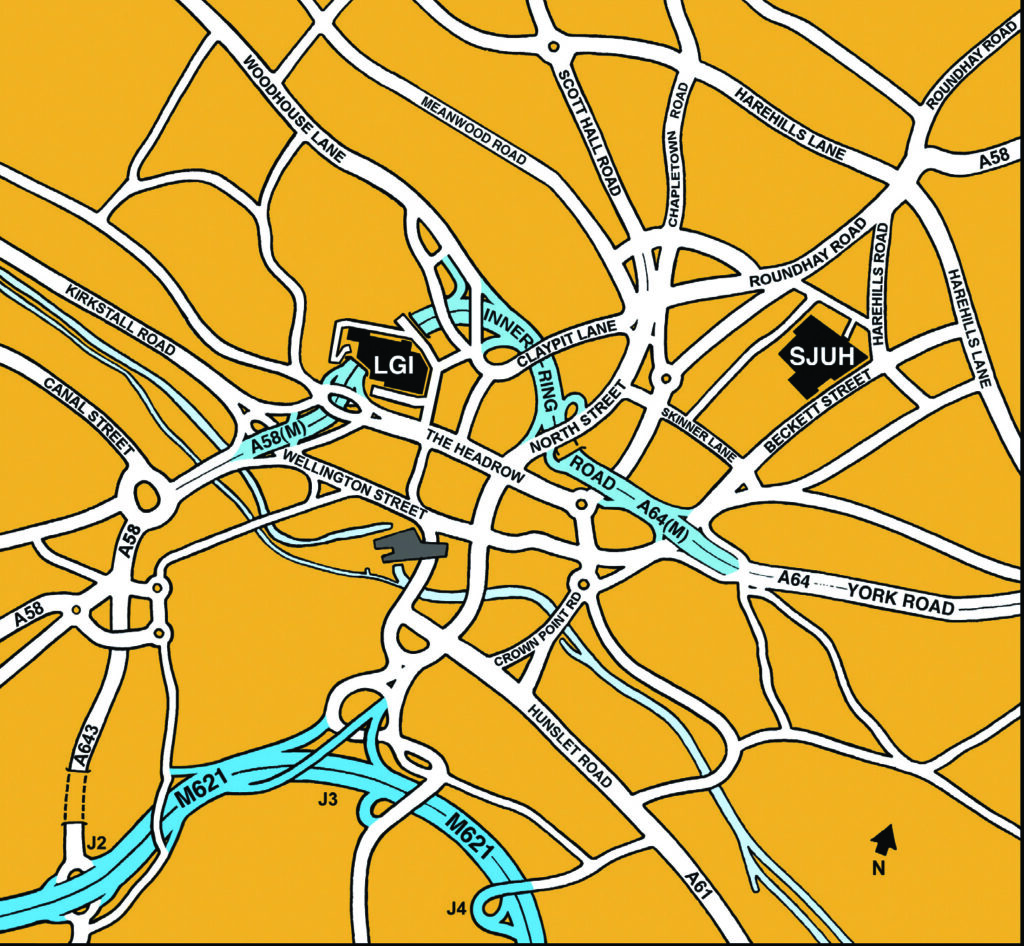
St James’s University Hospital – site plan
